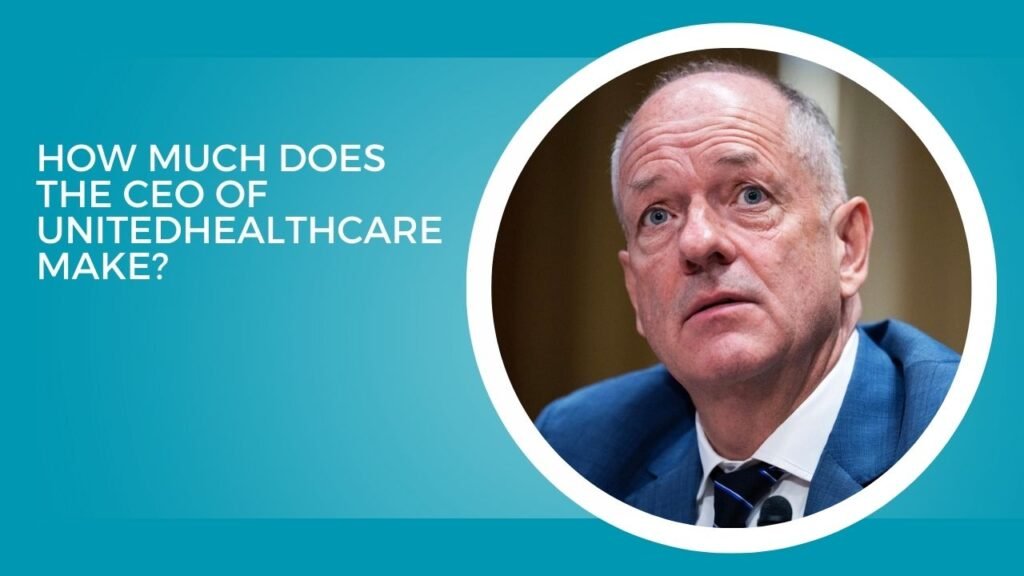How Much Does The CEO Of UnitedHealthcare Make? In 2023, Andrew Witty, CEO of UnitedHealth Group (which includes UnitedHealthcare), received total compensation of $23.5 million.
UnitedHealthcare, a division of UnitedHealth Group, is one of the largest healthcare insurers in the world, providing medical benefits to millions of people.
As the head of such a large and influential company, the CEO holds a critical position, overseeing key decisions that impact not only the company’s performance but also the lives of countless individuals who rely on its services. But how much does the CEO of UnitedHealthcare make for carrying out this high-stakes role?
In this blog post, we’ll take a deep dive into the compensation packages of the CEOs of UnitedHealthcare, focusing on the pay of Andrew Witty, the current CEO, and Brian Thompson, the former CEO who tragically passed away in late 2024.
We’ll also explore the factors that influence CEO compensation, the ethical considerations of high executive pay in the healthcare sector, and how UnitedHealth’s performance impacts CEO salaries.
Contents
- 1 Who is the CEO of UnitedHealthcare?
- 2 Breakdown of CEO Compensation
- 3 How CEO Compensation is Determined
- 4 The Ethics of CEO Compensation
- 5 The Impact of UnitedHealth’s Performance on CEO Pay
- 6 Frequently Asked Questions (FAQs)
- 6.1 Why is the CEO of UnitedHealthcare paid so much?
- 6.2 What are the components of a CEO’s compensation package?
- 6.3 How does Andrew Witty’s compensation compare to other healthcare CEOs?
- 6.4 Is CEO compensation tied to UnitedHealth’s financial performance?
- 6.5 Why do people criticize high CEO salaries in healthcare?
- 7 Conclusion: How Much Does The CEO Of UnitedHealthcare Make?
Who is the CEO of UnitedHealthcare?
Andrew Witty: Current CEO of UnitedHealth Group
Andrew Witty is the current CEO of UnitedHealth Group, the parent company of UnitedHealthcare. UnitedHealth Group is one of the world’s largest health insurance providers, and under Witty’s leadership, the company has continued to experience growth in revenue and customer base.
Witty took on the role of CEO in 2021, succeeding David Wichmann, who retired after leading the company for several years. [How Much Does The CEO Of UnitedHealthcare Make?]
Witty, a seasoned executive, has a wealth of experience in the healthcare sector, having previously served as CEO of GlaxoSmithKline, a global pharmaceutical company.
As CEO of UnitedHealth Group, Witty is responsible for making decisions that guide the company’s strategy, investments, and operations across its various divisions, including UnitedHealthcare.
His role is integral to managing the company’s complex portfolio, which includes everything from health insurance to data analytics and healthcare technology.
Brian Thompson: Former CEO of UnitedHealthcare
Brian Thompson was the CEO of UnitedHealthcare until his untimely passing in December 2024. Thompson had a long career at UnitedHealth Group, serving in various leadership roles before becoming the CEO of UnitedHealthcare, the company’s health benefits arm.
During his tenure, UnitedHealthcare saw significant expansion and solidified its position as a leader in the healthcare insurance industry. [How Much Does The CEO Of UnitedHealthcare Make?]
Tragically, Thompson passed away in late 2024, leaving a leadership vacuum at the company. Prior to his passing, Thompson was known for his leadership style and efforts to improve the accessibility and affordability of healthcare.
He played a major role in expanding UnitedHealthcare’s reach, particularly in the individual and government-sponsored healthcare markets.
Breakdown of CEO Compensation
Andrew Witty’s Compensation (2023)
In 2023, Andrew Witty received a total compensation of $23.5 million. This figure includes his base salary, performance bonuses, stock options, and other benefits that make up his executive pay package. Let’s break it down:
- Base Salary: Witty’s base salary is a significant portion of his compensation, though it’s just one part of the overall package. His salary is typically around $1.5 million annually. [How Much Does The CEO Of UnitedHealthcare Make?]
- Bonuses and Performance-Based Compensation: Witty’s bonuses are tied to the company’s performance. In 2023, he earned substantial bonuses as a reward for UnitedHealth’s strong financial performance, which included impressive revenue growth and a stable increase in membership. These performance bonuses can make up a significant portion of his compensation, often adding millions to his overall earnings.
- Stock Options and Equity: A key component of Witty’s compensation package includes stock options and equity in the company. These are performance-based and designed to align his interests with those of shareholders. In 2023, his stock-based compensation amounted to over $10 million.
- Other Benefits: Like most high-ranking executives, Witty also receives additional benefits, such as retirement plans, healthcare, and other perks commonly offered to top-tier executives in the corporate world.
Brian Thompson’s Compensation (2024)
Before his passing, Brian Thompson’s compensation was approximately $10.2 million annually. Although Thompson’s total pay was significantly lower than Andrew Witty’s, it still placed him among the highest-paid CEOs in the healthcare sector. Here’s how his compensation was structured:
- Base Salary: Thompson’s base salary was approximately $1 million per year. This was standard for a CEO at a company of UnitedHealth’s size and prominence.
- Bonuses and Incentives: Like Witty, Thompson’s compensation included performance-based bonuses. The company’s growth in revenue, expansion into new markets, and positive financial results were factors that influenced the size of his bonuses.
- Stock Options and Equity: Thompson also received stock options and equity as part of his compensation package. These incentives were based on the company’s long-term performance, rewarding Thompson for making decisions that would benefit UnitedHealth Group and its shareholders.
- Other Benefits: In addition to his salary and bonuses, Thompson received other benefits, such as retirement contributions and healthcare plans. [How Much Does The CEO Of UnitedHealthcare Make?]
How CEO Compensation is Determined
Factors Influencing Compensation
The compensation of CEOs in large corporations like UnitedHealth Group is determined by several factors, including:
- Company Performance: The most significant factor in determining CEO pay is the performance of the company. CEOs are often rewarded with bonuses and stock options that are tied to the company’s financial results. For example, strong revenue growth, market share expansion, and profitability all contribute to a higher pay package.
- Industry Standards: The healthcare industry, particularly large insurance companies like UnitedHealth, tends to offer higher executive compensation compared to other industries. This is due to the complexity of running such large, multifaceted companies, as well as the size and scope of their operations. [How Much Does The CEO Of UnitedHealthcare Make?]
- Executive Experience and Expertise: The experience and track record of the CEO also influence their pay. In the case of Andrew Witty, his extensive experience in both the healthcare and pharmaceutical sectors likely played a role in determining his compensation. Thompson’s long career at UnitedHealth Group also made him an attractive candidate for the role of CEO.
Comparison with Other Healthcare CEOs
When compared to other CEOs in the healthcare sector, both Andrew Witty and Brian Thompson’s compensation packages are quite competitive. For example, the CEO of CVS Health earned around $20 million in 2023, while the CEO of Cigna made a similar amount.
These figures show that compensation for CEOs in large healthcare companies tends to be in the range of $10 to $25 million, depending on performance and company size.
The Ethics of CEO Compensation
Why High CEO Pay?
High CEO pay, especially in industries like healthcare, has often been a point of public debate. The argument for high executive compensation usually centers around the need to attract and retain top talent.
Leading a multi-billion-dollar corporation like UnitedHealth requires expertise, strategic vision, and the ability to manage complex systems.
As such, companies are often willing to offer large compensation packages to ensure they hire the most qualified individuals. [How Much Does The CEO Of UnitedHealthcare Make?]
However, the ethics of CEO pay are often questioned, particularly when there is a stark contrast between executive salaries and the compensation of lower-level employees.
In healthcare, this debate is heightened by the essential role that companies like UnitedHealthcare play in people’s lives, raising concerns about how much executives should be paid when many customers struggle with healthcare affordability.
Public Perception and Criticism
Public perception of CEO pay can be quite negative, especially when it comes to healthcare companies. Many people feel that healthcare providers, which profit from the health of others, should not reward their executives with such exorbitant salaries.
Additionally, shareholders and employees sometimes express frustration over the amount of money that goes to executives rather than being reinvested into improving services or lowering costs for consumers.
See Also: How Much Does The CEO Of Save The Children Make?
The Impact of UnitedHealth’s Performance on CEO Pay
Company Performance and Its Role in Executive Compensation
UnitedHealth Group’s strong performance has been a major factor in determining the compensation of its CEOs. [How Much Does The CEO Of UnitedHealthcare Make?]
In recent years, the company has seen substantial revenue growth, fueled by its health insurance arm, UnitedHealthcare, and its Optum division, which provides healthcare services and data analytics.
When a company like UnitedHealth performs well, it generally rewards its CEO with higher compensation, as the CEO’s leadership is seen as a key factor in that success.
Corporate Growth and CEO Rewards
UnitedHealth’s growth in the healthcare insurance market, along with its expansion into new service areas like telemedicine and data analytics, directly impacts the pay of its CEO.
As the company increases its market share and revenue, the CEO’s compensation rises, reflecting their contribution to that success. [How Much Does The CEO Of UnitedHealthcare Make?]
In both Witty’s and Thompson’s cases, their leadership has played a critical role in driving UnitedHealth Group’s expansion, making them deserving of high compensation.
Frequently Asked Questions (FAQs)
Why is the CEO of UnitedHealthcare paid so much?
The CEO of UnitedHealthcare is compensated highly due to the complexity of managing one of the world’s largest healthcare companies. High pay is also used to attract and retain top executive talent in a competitive industry.
What are the components of a CEO’s compensation package?
A CEO’s compensation package typically includes a base salary, performance-based bonuses, stock options, equity in the company, and various other benefits such as healthcare and retirement plans.
How does Andrew Witty’s compensation compare to other healthcare CEOs?
Witty’s total compensation of $23.5 million in 2023 is in line with other top healthcare CEOs. It’s higher than some, but also within the range of compensation for leaders of large healthcare firms.
Is CEO compensation tied to UnitedHealth’s financial performance?
Yes, a significant portion of the CEO’s compensation is based on the company’s financial performance, including revenue growth, profitability, and shareholder returns.
Why do people criticize high CEO salaries in healthcare?
High CEO salaries in healthcare are criticized because they seem disproportionate to the compensation of lower-level employees and the financial challenges faced by many customers in accessing affordable healthcare.
Conclusion: How Much Does The CEO Of UnitedHealthcare Make?
CEO compensation at UnitedHealthcare is substantial, with Andrew Witty earning a total of $23.5 million in 2023 and Brian Thompson earning $10.2 million in 2024 before his tragic passing.
These figures are reflective of the leadership required to manage such a large and complex healthcare company. [How Much Does The CEO Of UnitedHealthcare Make?]
While executive pay is often a subject of debate, it’s clear that in industries like healthcare, where stakes are high and competition is fierce, companies must offer competitive compensation packages to attract top talent.
Whether these salaries are ethically justified remains a point of contention, especially when considering the impact of rising healthcare costs on consumers.

Lyanna Mann is from South Carolina, USA. She finished college in marketing. She wants to work in private companies and become a CEO one day. She spends time learning about what CEOs do, how hard they work, their plans, and how much money they make.

